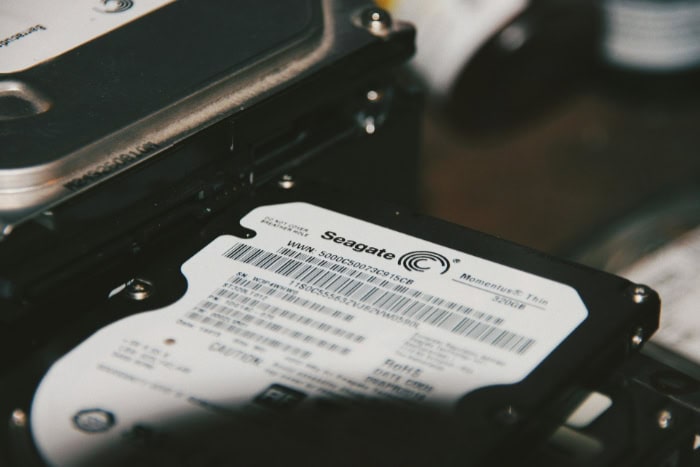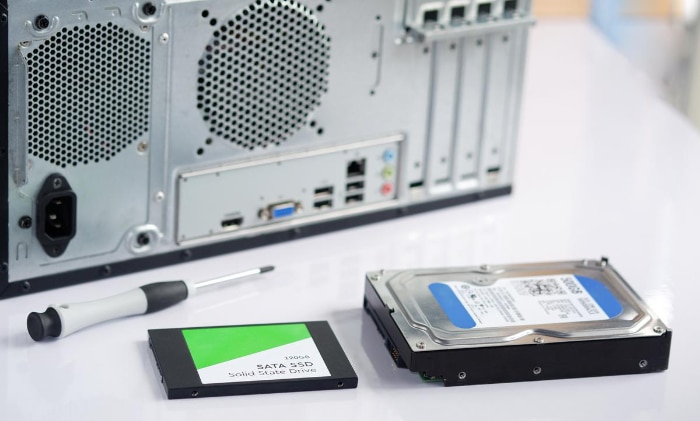SSD vs. HDD: Choose the Right Drive for Your Needs

The choice of storage drive can significantly impact how your system performs, whether you’re a casual user or a professional dealing with large amounts of data. From boot times to file transfers, and even how quickly your favorite games load, the right storage solution matters.
Two of the most common options available today are Solid State Drives (SSDs) and Hard Disk Drives (HDDs). While both serve the same purpose—storing your data—they do so in very different ways, each with its own set of pros and cons.
Performance and Speed
When it comes to choosing a storage device, performance and speed are often at the forefront of user concerns. The speed of a drive directly affects how quickly data can be read, written, and accessed, which in turn impacts everything from system boot times to application performance.
SSDs and HDDs approach this in fundamentally different ways, and those differences are quite noticeable in real-world usage.
Read/Write Speeds
The most significant performance disparity between SSDs and HDDs lies in their read and write speeds.
HDDs rely on spinning mechanical platters and a moving read/write head, which means data access is physically limited by the speed at which the platters spin and the head moves.
Most consumer-grade HDDs have speeds of 100 to 200 megabytes per second (MB/s) for reading and writing data. While this may seem sufficient for basic tasks, it quickly becomes a bottleneck in more demanding scenarios, such as transferring large files or running complex software.
In contrast, SSDs use flash memory without any moving parts. This allows for much faster data access, with even budget SSDs typically offering read/write speeds in the range of 500 to 600 MB/s.
Higher-end SSDs, particularly those using the NVMe (Non-Volatile Memory Express) protocol, can reach speeds of 3,000 MB/s or more. This difference is drastic and can be immediately felt in everyday tasks, from copying files to loading programs.
For users who need to transfer or process large amounts of data, the near-instantaneous access provided by SSDs is a game-changer.
System Boot and Application Load Times
The impact of storage speed is most noticeable when turning your computer on or opening applications. HDDs, due to their mechanical design, require time to spin up the platters and locate the necessary data.
This results in noticeably longer boot times—sometimes as long as a minute or more for older systems. Similarly, launching software or opening large files can feel sluggish, as the drive struggles to fetch the required data.
SSDs, on the other hand, can drastically reduce boot times to just a few seconds. Since SSDs don’t need to physically search for data, they can instantly access system files, allowing a much faster startup. The same holds true for application load times.
Whether you’re opening a browser, starting a game, or launching a video editing program, everything happens quicker on an SSD. Programs that would take 15 to 30 seconds to load on an HDD typically open in just a few seconds with an SSD.
This is especially beneficial for users who need to multitask or rely on resource-heavy software throughout the day.
Impact on Gaming and Software Performance
For gamers and professionals using data-intensive applications, storage speed can have a significant impact on performance. In gaming, while the storage drive doesn’t directly affect in-game frame rates, it does influence load times.
Games installed on an HDD can take considerably longer to load levels, textures, or assets, leading to delays between gameplay sessions.
An SSD can cut these load times by more than half, allowing players to jump into action faster and reducing the frustration of waiting between levels.
In professional environments, such as video editing, software development, or 3D rendering, the performance difference between SSDs and HDDs becomes even more apparent.
These tasks involve handling large files, and the ability to read and write data quickly is crucial.
An SSD can significantly speed up the time it takes to import, export, or process large media files, allowing professionals to work more efficiently.
For example, video editors working with 4K or higher resolutions will benefit from the faster data access provided by SSDs, reducing the time needed for rendering and exporting projects.
Storage Capacity

Storage capacity is a critical factor when selecting a drive, as it determines how much data can be stored. While both SSDs and HDDs serve this purpose, they differ significantly in terms of maximum available sizes, cost efficiency, and suitability for various use cases.
Maximum Storage Sizes
When it comes to maximum storage capacities, HDDs generally dominate the market. It is common to find consumer HDDs with capacities of 2TB, 4TB, or even 10TB at accessible price points.
This high capacity makes HDDs an attractive option for users who require substantial storage for large files, such as videos, photos, and extensive media libraries.
In contrast, while SSDs have made significant advancements in capacity over the years, they typically lag behind HDDs in terms of maximum sizes available for consumer use.
Most consumer SSDs range from 250GB to 4TB, with some high-end models reaching 8TB.
However, these larger SSDs come at a premium, making them less practical for users who prioritize storage space over speed. As a result, for those needing vast amounts of storage, HDDs remain the more viable option.
Cost per Gigabyte
The cost of storage is another crucial consideration. Generally, HDDs offer a lower cost per gigabyte compared to SSDs.
The price of HDDs has decreased over the years, making large capacities affordable for consumers. For instance, it is common to find a 2TB HDD priced significantly lower than a similarly sized SSD.
This cost disparity makes HDDs an appealing choice for users who need extensive storage without breaking the bank.
On the other hand, SSDs, while offering superior performance, tend to be more expensive per gigabyte. The manufacturing process for SSDs, which involves advanced flash memory technology, contributes to this higher cost.
As users look to expand their storage, especially at capacities greater than 1TB, the price difference becomes a vital consideration. While SSD prices are gradually decreasing, they still represent a larger investment for users focused on maximizing storage capacity.
Suitability for Different Use Cases
Different storage needs necessitate different solutions. Users prioritizing speed and performance, such as gamers or professionals working with demanding applications, may lean toward SSDs despite their higher cost and lower capacity.
However, for those primarily focused on storage, such as media creators, photographers, or anyone managing large data archives, HDDs are often the better choice.
For example, individuals building a media library filled with movies, music, and high-resolution images will find HDDs to be more suitable due to their higher capacities and lower costs.
Similarly, businesses that require extensive backups or archives of data often opt for HDDs to store large volumes of information economically.
In addition, many users choose to implement a hybrid approach, utilizing both SSDs and HDDs in their systems.
For instance, an SSD can be used for the operating system and frequently accessed applications, while an HDD serves as a primary storage solution for larger files and backups.
This combination allows users to enjoy the benefits of rapid access speeds without sacrificing storage capacity.
Durability and Reliability

Durability and reliability are crucial factors to consider when selecting a storage device, as they influence how well a drive can withstand everyday use and the longevity of the data it stores.
The inherent differences between Solid State Drives (SSDs) and Hard Disk Drives (HDDs) play a significant role in their performance over time, especially concerning physical robustness, failure rates, and data recovery options.
Mechanical vs. Solid-State Components
A fundamental difference between SSDs and HDDs is the presence of moving parts. HDDs consist of spinning platters and a mechanical read/write head that moves across the surface to access data.
This mechanical design makes HDDs more susceptible to physical damage from shocks, drops, or vibrations. If an HDD is subjected to abrupt movements while in operation, it can lead to read/write head crashes, resulting in data loss or drive failure.
In contrast, SSDs use flash memory technology, which has no moving parts. This solid-state architecture allows SSDs to be more resilient against physical shocks and environmental factors.
Users can move an SSD without fear of damaging it, making it a better choice for portable devices or situations where a drive might experience rough handling.
The absence of mechanical components also means that SSDs operate silently and generate less heat, contributing to their overall reliability.
Failure Rates and Lifespan
Both SSDs and HDDs have specific failure modes that affect their reliability over time. HDDs are prone to mechanical wear and tear due to their moving parts.
Over time, the constant spinning of the platters and the movement of the read/write head can lead to failure, especially in older drives. Typical signs of impending HDD failure include unusual noises, slow performance, and difficulty accessing data.
On the other hand, SSDs face a different challenge: limited write cycles. Each cell in an SSD has a finite number of times it can be written to before it begins to wear out.
Modern SSDs have incorporated technologies such as wear leveling and over-provisioning to extend their lifespan, but they still have a limited endurance compared to HDDs.
While many SSDs can last for several years under normal use, heavy write-intensive applications may accelerate wear and lead to earlier failure.
Data Recovery Considerations
When it comes to recovering lost data, the differences between SSDs and HDDs become more pronounced.
Data recovery from an HDD can often be performed through traditional methods, as the mechanical components can allow for the recovery of data even after physical damage, as long as the platters remain intact.
Specialized data recovery services can often retrieve lost files from malfunctioning HDDs, making it feasible to recover important data.
In contrast, recovering data from an SSD can be more complicated due to its complex architecture. SSDs use techniques such as TRIM, which helps manage storage space but can also lead to permanent data deletion if files are deleted.
Once data is erased from an SSD, it may not be recoverable, even with professional assistance. This complexity makes data loss on SSDs more challenging, emphasizing the importance of regular backups to prevent irreversible data loss.
Power Consumption and Heat Generation

Power consumption and heat generation are often overlooked factors when comparing storage devices, but they play a vital role in system performance and longevity.
As technology advances, the need for energy-efficient components has become increasingly important, particularly in portable devices like laptops and tablets.
Energy Efficiency
One of the standout advantages of SSDs is their energy efficiency. Since SSDs operate using flash memory and lack mechanical components, they consume significantly less power than HDDs.
Typical power consumption for an SSD ranges from 2 to 4 watts during active use, while HDDs generally require 6 to 10 watts or more, especially during read/write operations.
This reduced power draw not only leads to lower electricity costs but also contributes to a more sustainable computing environment.
For users who prioritize energy savings, especially in mobile devices, SSDs present a clear advantage. In scenarios where devices are running on battery power, this energy efficiency translates into longer usage times between charges.
As a result, SSDs are often the preferred choice for ultrabooks and other portable devices designed for mobility and efficiency.
Heat Output
Heat generation is another critical aspect where SSDs outperform HDDs. The mechanical nature of HDDs entails moving parts that generate heat during operation.
Over time, excessive heat can lead to thermal throttling, where the drive reduces its performance to avoid overheating, potentially affecting overall system stability.
In compact devices, such as laptops, the heat generated by an HDD can lead to increased internal temperatures, which may further impact other components.
Conversely, SSDs produce considerably less heat due to their non-mechanical design. This lower heat output contributes to a cooler operating environment, which is especially vital in laptops or any device with limited airflow.
A cooler system can enhance performance and longevity, as excessive heat can degrade both the storage device and other internal components over time.
Impact on Battery Life in Portable Devices
The combination of lower power consumption and heat generation makes SSDs particularly beneficial for battery-powered devices. In laptops, every watt saved can extend battery life, allowing users to work longer without needing to recharge.
This is especially important for students or professionals who rely on their laptops throughout the day without consistent access to power sources.
When using an SSD, users can expect a more efficient system that not only performs faster but also conserves energy.
The result is a better overall experience, as longer battery life facilitates productivity and convenience during travel or in situations where charging opportunities are limited.
Use Cases and Recommendations

Selecting the right storage solution often depends on the specific needs and use cases of the user. Different scenarios call for different types of storage, whether it be for high-performance tasks, bulk data storage, or a combination of both.
Best for High Performance (Gaming, Video Editing)
For users engaged in high-performance tasks, such as gaming or video editing, Solid State Drives (SSDs) are the clear choice. The rapid read and write speeds of SSDs significantly enhance performance, leading to quicker loading times for games and applications.
In gaming, for instance, SSDs can drastically reduce the time it takes to load levels, allowing players to jump into action almost immediately. This speed advantage can also result in smoother gameplay and improved overall user experience.
In video editing and other data-intensive applications, the performance benefits of SSDs are even more pronounced. These tasks often involve working with large files that require fast access times.
An SSD enables quicker file transfers and faster rendering times, which can be crucial for professionals who rely on efficiency to meet deadlines. For anyone who frequently runs demanding software or engages in activities that require rapid data access, an SSD is a worthwhile investment.
Best for Bulk Storage (Media Libraries, Backups)
On the other hand, users with significant storage needs, such as those managing extensive media libraries or performing regular backups, will find Hard Disk Drives (HDDs) to be a more practical option.
HDDs offer a much higher storage capacity at a lower price compared to SSDs, making them ideal for users who need to store large volumes of data without incurring high costs.
For instance, a photographer with thousands of high-resolution images or a videographer with numerous raw footage files may require multiple terabytes of storage.
In these cases, HDDs provide the necessary space at an affordable price point, allowing users to keep their data organized without the financial strain associated with purchasing multiple SSDs.
Additionally, HDDs are suitable for long-term data backup solutions, as they can store vast amounts of information for archiving purposes.
Hybrid Solutions (Combining SSD and HDD)
A hybrid approach can also be highly effective, combining the strengths of both SSDs and HDDs. This strategy involves using an SSD for the operating system and applications, while an HDD serves as a mass storage solution for larger files.
By utilizing an SSD for frequently accessed data, users benefit from the speed and efficiency it offers for everyday tasks, such as booting up the system and launching applications.
Meanwhile, the HDD can handle less frequently accessed data, such as media files, backups, and archives, where speed is less critical. This combination maximizes performance while ensuring ample storage capacity, providing a balanced solution that caters to a variety of needs.
Many gamers and content creators find this setup to be particularly advantageous, as it allows for both a responsive user experience and sufficient space for large files.
Conclusion
Selecting between Solid State Drives (SSDs) and Hard Disk Drives (HDDs) involves considering various factors such as performance, storage capacity, durability, power consumption, and specific use cases.
SSDs excel in speed and are ideal for tasks that demand quick data access, such as gaming and video editing.
Their energy efficiency and lower heat output make them suitable for portable devices, enhancing battery life and overall performance.
On the other hand, HDDs offer greater storage capacities at a lower cost, making them the preferred choice for users needing large amounts of space for media libraries and backups.
For many, a hybrid approach that combines both SSDs and HDDs provides an optimal balance, allowing for fast access to frequently used applications while still accommodating extensive data storage needs.



